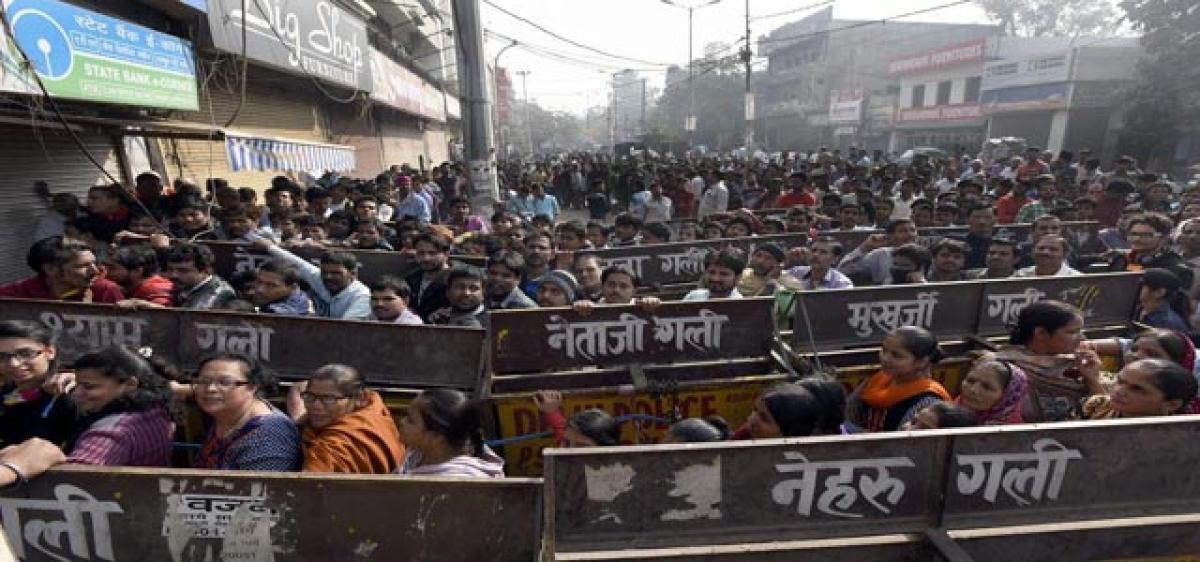Live
- Minister Meghwal to table ‘One Nation, One Election’ Bill in Lok Sabha on Monday
- 3rd Test: Day one’s play at the Gabba called off due to persistent rain
- National Energy Conservation Day: Switch to Energy-Efficient Devices
- Rekha gets emotional as she shares a heartfelt moment with Big B's grandson Agastya Nanda
- Senior Cong leader EVKS Elangovan passes away in Chennai
- CID's Counter Intelligence raids multiple places in J&K’s Anantnag, Kulgam districts
- India's growth on resilient trajectory, equity markets in consolidation phase
- KJo on 23 years of ‘Kabhi Khushi Kabhie Gham’: One of those pinch me moments
- WPL 2025 auction: Nandini, Kamalini set to be most sought-after names
- MP CM to inaugurate Sarsi resort in Shahdol, 200-bed hospital in Mauganj today
Just In

One would assume that an economic decision as important as demonetisation was based on, and driven by, evidence and strong data.
One would assume that an economic decision as important as demonetisation was based on, and driven by, evidence and strong data. It is, however, clear by now that this decision has been taken without any robust assessment of the proportion of black money held in cash, the quantum of notes with the public, and the number of notes actually in circulation.
Even political decisions such as this have to be taken in a scientific manner. The decision was so secret, and the decision-making group so exclusive, that we might never know the basis for the decision. Even during the very challenging and complex process of implementation, it is clear that the government is in a knee-jerk decision-making mode, consistently ignoring the use of evidence to implement its own flawed policy.
The policy of demonetisation has clearly failed to meet its initial objectives. What is unforgivably worse is the pain and inconvenience caused to the entire citizenry due to a complete failure to take data, facts and capacities into consideration. When the government knew that it is pulling out Rs 15.3 trillion from the economy, it obviously refrained from assessing the number of days it would take to pour the equivalent quantum of currency back into the system, given the finite number of printing presses in operation.
Clearly, no calculated logic was applied in the Prime Minister declaring that the situation would resolve itself by December 30, when even the most conservative estimates show that the process would take up to four months even when all goes well. India has historically proven to be a country geared to implementing grand, one-time initiatives with skill and efficiency.
A constitutional authority tasked with the critical responsibility of conducting fair and free elections every five years invests onerous amounts of time in scheduling poll dates, demarcating voting booths and fixing responsibilities on over 15 lakh officials based on a universe of factual information and data points. This is done with utmost precision to ensure that the process of voting takes place as planned without causing any distress to citizens.
A decision like demonetisation that affects every single citizen of the country suggests not even a fraction of such discipline in its design and implementation. Though the government takes great pride in attributing the notification of nearly 60 circulars on demonetisation to a "responsive" administration, the truth is that this is a reflection of the complete absence of clarity in where they were heading.
Though the state and its institutions are duty bound to report on the impact, including unintended damage caused by its policy, there has been no official release on the impact of demonetisation in curbing corruption and eradicating terrorism. The drastic reduction in the public stature of the Reserve Bank of India (RBI) by appearing complicit with the government's intentions is also worrying.
The RBI has resorted to making minutes of its board meetings secret citing "protection of the country's security and integrity". Such a move has not taken place in any respectable central bank in the world, however deep a crisis its economy be in. Transparency in the process of decision-making, especially of matters stated to be of a greater public good, is not an indulgence. It is a right.
People are suffering a range of consequences from this move – from death, to loss of livelihoods of agricultural labourers and migrant workers, and enterprise shocks. But still the palpable reaction of people is that of patience and hope. A vague carrot of poetic justice is being subtly communicated to the people, that the stick will be used on the affluent and corrupt, and the fruits will reach the empty bank accounts of the poor.
Beyond the crisis and shock of demonetisation, the recognition of an elected government's ability to craft, manage and dominate a discourse is a worrying sign for any rational policymaking framework, and indeed for democracy itself.
By Rakshita Swamy

© 2024 Hyderabad Media House Limited/The Hans India. All rights reserved. Powered by hocalwire.com







